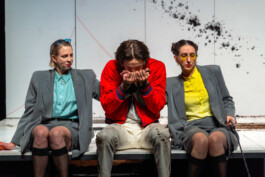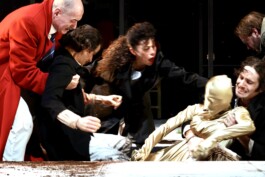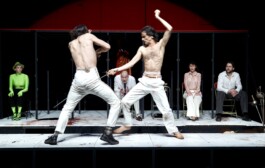
Hamlet
costumes | costumes
de William Shakespeare
Traduction | adaptation : Caroline Lamarche et Christophe Sermet
Mise en scène | direction : Christophe Sermet
Création : Théâtre National, Bruxelles, janvier 2025
Hamlet, c’est la tragédie de l’intime se heurtant au monde extérieur avec fracas. C’est l’avènement de l’individu qui prend conscience qu’il est un mystère pour lui-même. Dans le contexte actuel d’accélération du virage numérique, son questionnement sur le rapport à soi et sur la fixité de l’identité est d’une profondeur renouvelée.
Dans le théâtre de Christophe Sermet, nul besoin de relectures conceptuelles ni de transpositions éclatées pour ancrer les classiques dans une réflexion féconde sur notre époque. Sa vision d’Hamlet reste collée à l’intrigue originale : c’est l’histoire du prince du Danemark revenant au pays pour venger son père et qui trouve dans le théâtre et dans le jeu de la folie (feinte) un espace inouï de révélations. Sermet approche Hamlet comme le ferait un archéologue creusant dans les versions anciennes et moins anciennes du texte phare, pour y trouver tantôt un son éloquent, tantôt un mouvement vif, tantôt une perspective étonnante. Autant d’élans qu’il retranscrit dans une langue aussi exubérante que directe et frontale : un plaisir brut pour les acteur·ices.
Dans cette mise en scène qui se méfie de trop de grandiloquence, Hamlet rentre au bercail dysfonctionnel pour venger son père et y retrouve un Danemark flottant, sorte d’île à la dérive. Un espace détaché de la terre ferme, où l’on vit en vase clos en se surveillant les un·es les autres. Un ilôt de folie que l’on ne peut fuir qu’en se jetant dans l’océan, dans le néant, dans la mort.
Sur ce morceau de terre, la fiction et le théâtre serviront de miroir et de révélateur au prince du Danemark. Christophe Sermet accentue la métathéâtralité pour questionner la fonction du théâtre et de l’art dans un monde d’extimité glorifiée. La scène reste-t-elle le meilleur véhicule de l’intime?
Hamlet is the tragedy of the intimate self clashing violently with the outside world. It marks the emergence of the individual who becomes aware that he is a mystery to himself. In today’s context of rapid digital transformation, Hamlet’s questioning of self-relationship and the fixity of identity takes on a renewed depth.
In Christophe Sermet’s theatre, there is no need for conceptual reinterpretations or fragmented transpositions to root the classics in a fertile reflection on our time. His vision of Hamlet remains faithful to the original plot: it is the story of the Prince of Denmark returning home to avenge his father, discovering in theatre and in the (feigned) madness an extraordinary space of revelation. Sermet approaches Hamlet like an archaeologist excavating both ancient and more recent versions of this seminal text, seeking at times a resonant sound, a sharp movement, or a surprising perspective. These impulses are conveyed through a language that is as exuberant as it is direct and unflinching—a raw pleasure for the actors.
In this production, wary of excessive grandiloquence, Hamlet returns to his dysfunctional home to avenge his father and finds a Denmark adrift—a kind of floating island. A space disconnected from solid ground, where people live in close quarters and constantly watch one another. A microcosm of madness that can only be escaped by plunging into the ocean, into the void, into death.
On this fragment of land, fiction and theatre serve as mirror and revelation for the Prince of Denmark. Christophe Sermet intensifies the metatheatrical dimension to question the role of theatre and art in a world obsessed with extimacy. Does the stage still remain the best vehicle for expressing the intimate self?






